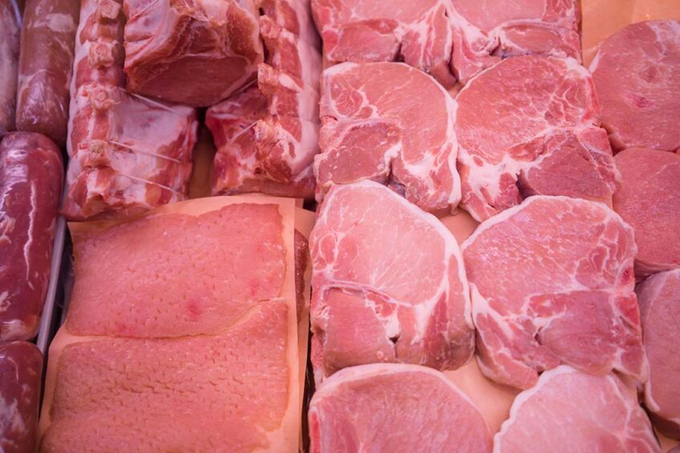June 20, 2025 | 22:06 GMT +7
June 20, 2025 | 22:06 GMT +7
Hotline: 0913.378.918
June 20, 2025 | 22:06 GMT +7
Hotline: 0913.378.918
The good news is that many measures to reduce the environmental impact already exist or are even being implemented.

In the report, Rabobank expects the carbon footprint/kg of pork at farm level to be at least 22% lower in 2030 than in 2020. Photo: Canva
That is the result of a Rabobank study on the carbon footprint of pig meat production. Rabobank expects the pig production chain to become more environmentally friendly.
The main drivers behind the tendency are governmental measures and market developments. The most important basis for all this are the Paris climate agreements of 2020. Many countries agreed that by 2030, greenhouse gas emissions should be at least 55% lower than in 1990. Livestock farming must also contribute to achieving the goals.
In the report, Rabobank expects the carbon footprint/kg of pork at farm level to be at least 22% lower in 2030 than in 2020. That is assuming that the soy used did not cause rain forest disappearance, and dditional use is made of locally produced raw materials. Also, more by-products are used in feed, and the pigs’ better growth and lower feed conversion rates (FCR) contribute to lowering the environmental impact.
Of the total reduction, 8% comes from adjustments already underway, such as the use of green energy and increases in productivity. Some countries have already reached the 22% reduction threshold, the Netherlands being one of them. In that country, the pork chain expects to reduce pork’s carbon footprint by 40-50% in 2030.
Pig feed (production, transport, operations and land use) are responsible for 48% of the CO2 emissions generated by pig production. Emissions from manure, energy and fermentation account for another 40%. The remaining 12% occurs after the pigs leave the farm. Per country, differences are substantial. In the Netherlands, for instance, feed accounts for half to 65% of CO2 emissions. There are also large differences between farms, for example as a result of manure storage.
The 4 most effective ways to reduce the environmental impact of feed are:
Excluding soy for which rain forest has been cleared;
More by-products in the feed; and
Feeding residues from the humane sector.
Better management and genetic progress.
Greenhouse gas emissions caused by manure can be reduced by 80-90% when manure pits are cleaned out daily. That percentage depends on the technique used and the frequency with which the manure is removed from the house. For piglets and finishing pigs, there are various systems of manure pit emptying. For sows, this is less the case. Fresh finisher pig manure is more interesting to ferment in advance than sow manure, as the former contains more biogas.
Feed companies have already been offering feed strategies as well as products with a lower carbon footprint. For instance, Agrifirm’s Feed Forward concept is said to reduce the CO2 footprint of feed by about 15 to 30%, compared to regular finishing feed. Other feed companies also offer similar products. With moisture-rich by-products, it is also possible to reduce the carbon footprint of the feed component by up to 30%, depending on the percentage of compound feed that is being replaced.
The downside of all that is that low-carbon feed is more expensive. For that reason, incentives should be in place to choose those feeds. Ideally, they should come from the market. For example, a bonus in combination with longer-term agreements with retailers. Government subsidies and predictable policies are also important to make pig production more environmentally friendly, Rabobank wrote.
Finally, a transparent system is needed to monitor CO2 emissions with premiums that are in proportion to the performance delivered. After all, pig house modifications usually come with substantial levels of investment. In addition, a system like that will allow for an easy adjustment of rations.
(PP)

(VAN) Poultry production in Poland, which has only started recovering from devastating bird flu outbreaks earlier this year, has been hit by a series of outbreaks of Newcastle disease, with the veterinary situation deteriorating rapidly.

(VAN) Extensive licensing requirements raise concerns about intellectual property theft.

(VAN) As of Friday, a salmonella outbreak linked to a California egg producer had sickened at least 79 people. Of the infected people, 21 hospitalizations were reported, U.S. health officials said.

(VAN) With the war ongoing, many Ukrainian farmers and rural farming families face limited access to their land due to mines and lack the financial resources to purchase needed agricultural inputs.

(VAN) Vikas Rambal has quietly built a $5 billion business empire in manufacturing, property and solar, and catapulted onto the Rich List.

(VAN) Available cropland now at less than five percent, according to latest geospatial assessment from FAO and UNOSAT.

(VAN) Alt Carbon has raised $12 million in a seed round as it plans to scale its carbon dioxide removal work in the South Asian nation.